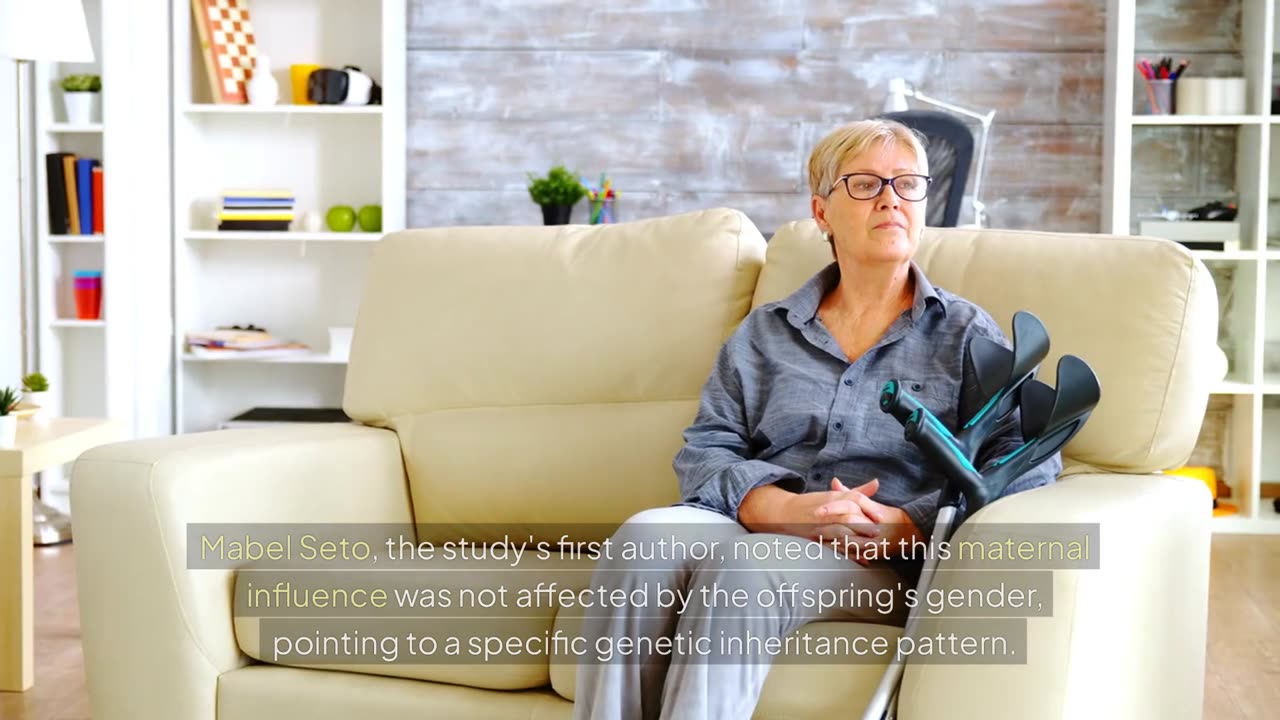Premium Only Content

if your mother had alzheimer ,you have high risk to have it
# Understanding the Genetic Links to Alzheimer's: Why Your Mother's Diagnosis Matters
## Introduction: The Silent Inheritance
Imagine learning that your likelihood of developing Alzheimer’s disease is significantly influenced by your mother’s health history. Recent research has illuminated a concerning link between maternal Alzheimer’s and increased risk for their offspring, highlighting the silent inheritance that could shape your future. This discovery not only deepens our understanding of Alzheimer’s but also underscores the importance of genetic factors in its development.
## Chapter 1: The Genetic Footprint of Alzheimer’s
### Unveiling the Study
A recent study published in JAMA Neurology by researchers from Mass General Brigham reveals that any instance of Alzheimer’s disease in the mother correlates with a heightened risk for their children. This finding marks a significant shift in understanding, as previous assumptions focused primarily on early-onset Alzheimer’s disease as a risk factor. The study analyzed 4,400 cognitively unimpaired adults and discovered increased amyloid levels—proteins linked to Alzheimer’s—in those with maternal history of the disease.
### The Role of Amyloid Proteins
Amyloid proteins, naturally occurring in the brain, become problematic when they accumulate abnormally, forming plaques that disrupt cell function. This buildup is a hallmark of Alzheimer’s disease. The study found that participants with a maternal history exhibited higher amyloid levels regardless of the mother’s age at onset, suggesting a potent genetic influence that transcends typical risk factors.
## Chapter 2: The Distinct Influence of Parental History
### Comparing Maternal and Paternal Risks
The study highlighted a striking difference between maternal and paternal histories. While early-onset Alzheimer’s in fathers was associated with increased risk for their children, any Alzheimer’s occurrence in mothers posed a significant risk. This distinction points to unique genetic contributions from mothers, possibly linked to mitochondrial DNA, which is inherited exclusively from the mother.
### Understanding Early-Onset Alzheimer’s
Early-onset Alzheimer’s, defined as occurring before age 65, has been a focal point for genetic research due to its strong hereditary component. The findings of this study expand the risk landscape, indicating that maternal history alone, regardless of onset age, is a crucial factor. This revelation calls for a broader approach in assessing familial risk and underscores the need for vigilant monitoring of individuals with maternal history.
## Chapter 3: Implications for Future Research
### Genetic Perspectives and Future Directions
The genetic intricacies of Alzheimer’s are vast and complex. This study’s findings open new avenues for research, particularly in understanding why maternal DNA plays such a pivotal role. Researchers aim to expand the study to diverse populations and explore how parental history influences cognitive decline and amyloid accumulation over time. This expansion is vital for developing inclusive and effective prevention strategies.
### The Importance of Diverse Representation
A noted limitation of the study was its predominantly non-Hispanic white participant base. To fully grasp the genetic factors at play, it’s essential to include diverse racial and ethnic groups. Differences in genetic backgrounds could reveal unique risk factors and protective elements, enriching our understanding of Alzheimer’s and leading to more tailored and equitable health interventions.
## Chapter 4: Practical Applications and Prevention
### Identifying At-Risk Individuals
The findings underscore the importance of considering maternal history in identifying at-risk individuals for ongoing and future prevention trials. Understanding one’s genetic predisposition allows for proactive measures, including lifestyle modifications and early interventions, which could delay or prevent the onset of Alzheimer’s.
### The Role of Clinical Trials
Reisa Sperling, a neurologist at Mass General Brigham and co-author of the study, emphasizes the potential of these findings in shaping future clinical trials. By identifying individuals with a maternal history of Alzheimer’s, researchers can better target prevention efforts and develop more effective treatments. This approach could revolutionize how we tackle Alzheimer’s, moving towards personalized medicine that addresses individual genetic profiles.
## Chapter 5: Navigating the Path Forward
### The Need for Awareness and Education
Awareness is crucial in managing and mitigating the risks associated with Alzheimer’s. Individuals with a family history of the disease, particularly on the maternal side, should be informed about their increased risk and the steps they can take to monitor and potentially reduce their chances of developing Alzheimer’s. Education campaigns and genetic counseling can play pivotal roles in this effort.
### The Role of Support Networks
Building robust support networks for those at risk is essential. Community programs, support groups, and healthcare providers need to work together to offer resources and guidance. This collective effort can empower individuals with the knowledge and tools they need to navigate their genetic predispositions and maintain cognitive health.
## Conclusion: Embracing Knowledge, Empowering Change
The revelation that maternal history significantly impacts the risk of developing Alzheimer’s highlights the intricate dance between genetics and disease. As we deepen our understanding of these connections, we can better equip ourselves and our communities to face the challenges ahead. Knowledge is power, and by embracing these findings, we take a crucial step towards a future where Alzheimer’s can be effectively managed, if not entirely prevented.
Thank you for reading! If you found this article insightful, please share it with your friends and family. Don’t forget to subscribe to our channel for more updates, like this post, and leave your thoughts in the comments below. Together, we can make a difference and support the fight against Alzheimer’s.
-
 LIVE
LIVE
megimu32
3 hours agoON THE SUBJECT: IRL Streamers Attacked & Nostalgic Animal Movies That Made Us Cry
373 watching -
 1:00:54
1:00:54
The Tom Renz Show
7 hours agoMore Epstein/FBI, a Scary Trade War, & the Dem Echo Chamber
7.49K1 -
 40:43
40:43
Kimberly Guilfoyle
8 hours agoDems Double Down on Delusion-Why? Live with Tony Kinnett & Bo French | Ep.202
77.8K31 -
 1:28:42
1:28:42
Redacted News
6 hours agoBREAKING! SOMETHING BIG IS HAPPENING IN EUROPE ALL OUT WAR IS COMING AGAINST RUSSIA, TRUMP FURIOUS
121K272 -
 47:50
47:50
Candace Show Podcast
6 hours agoBREAKING: Judge Makes Statement Regarding Taylor Swift's Text Messages. | Candace Ep 155
113K109 -
 1:14:23
1:14:23
Josh Pate's College Football Show
3 hours ago $0.29 earnedCFB’s Most Hated Teams | FSU & Clemson Future | Big Ten Win Totals | Star Rankings Overrated?
14.5K -
 1:33:47
1:33:47
CatfishedOnline
5 hours agoGoing Live With Robert - Weekly Recap
27.8K -
 55:18
55:18
LFA TV
1 day agoEurope’s Sudden Turn Against America | TRUMPET DAILY 3.6.25 7PM
32.2K3 -
 4:21
4:21
Tundra Tactical
4 hours ago $2.12 earnedPam Bondi MUST Enforce Due Process NOW!
23.7K1 -
 56:42
56:42
VSiNLive
5 hours agoFollow the Money with Mitch Moss & Pauly Howard | Hour 1
48K1